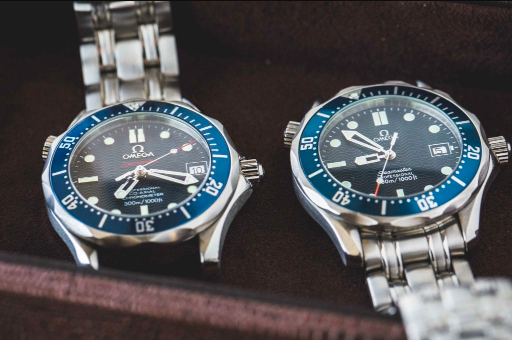Quartz vs. Mechanical: Which Movement is Right for You?

Choosing between a quartz and mechanical watch involves understanding the distinct characteristics of each type of movement. Both quartz and mechanical movements offer unique advantages and cater to different preferences. This guide provides an in-depth comparison to help you decide which type of watch best suits your needs and style.
1. Quartz Watches
Quartz watches are powered by electronic technology and are known for their accuracy and low maintenance.
Key Features:
Accuracy and Reliability
Quartz movements are renowned for their accuracy. A quartz crystal inside the watch vibrates at a precise frequency when an electric current is applied. This results in accurate timekeeping with minimal deviation. Quartz watches typically deviate by only a few seconds per month, making them highly reliable for precise timekeeping.
Maintenance Requirements
Quartz watches require minimal maintenance. The primary maintenance task is replacing the battery, which generally lasts between 1 and 5 years. Since quartz watches have fewer moving parts compared to mechanical watches, they experience less wear and tear, reducing the need for frequent servicing.
Cost and Accessibility
Quartz watches are generally more affordable than mechanical watches. The technology involved in quartz movements is less complex and cheaper to produce, making quartz watches a more budget-friendly option. This affordability allows for a wide range of styles and features within various price points.
Design and Features
Quartz watches come in a wide variety of designs, from simple and functional to complex and feature-rich. Many quartz watches include digital displays, alarms, backlighting, and other advanced functionalities. The versatility in design and features makes quartz watches suitable for both practical and aesthetic preferences.
2. Mechanical Watches
Mechanical watches operate using intricate engineering and craftsmanship, relying on a system of gears, springs, and levers.
Key Features:
Craftsmanship and Artistry
Mechanical watches are celebrated for their craftsmanship and intricate design. The process of creating a mechanical movement involves skilled watchmakers who assemble the watch’s components with precision. The resulting timepiece is often seen as a work of art, showcasing traditional watchmaking techniques and attention to detail.
Read also: The Power of Ooh screen: Revolutionizing Outdoor Advertising
Types of Mechanical Movements
Mechanical watches come in two main types: manual and automatic. Manual watches require the wearer to wind the watch regularly to keep it running. Automatic watches wind themselves through the motion of the wearer’s wrist, providing a more convenient option for continuous operation.
Longevity and Durability
Mechanical watches are known for their potential for long-term use. With proper care and regular servicing, a well-made mechanical watch can last for quartz vs mechanical watch decades or even generations. The robust construction of mechanical components allows them to endure various conditions, though they do require periodic maintenance to maintain accuracy.
Power Reserve
Mechanical watches have a power reserve that typically ranges from 24 to 72 hours. The power reserve is the duration the watch will continue to run after being fully wound. Some high-end mechanical watches feature extended power reserves, offering longer periods of uninterrupted operation.
Design and Aesthetics
Mechanical watches often feature elaborate and artistic designs. The complexity of the internal mechanics allows for intricate watchmaking and decorative elements, making them highly valued by collectors and enthusiasts who appreciate traditional craftsmanship.
3. Comparing Quartz and Mechanical Watches
Accuracy and Precision
Quartz watches excel in accuracy due to the precise vibrations of the quartz crystal. Mechanical watches, while generally accurate, can experience minor deviations due to the mechanical nature of their components. Regular servicing can help maintain the accuracy of mechanical watches.
Craftsmanship vs. Technology
Mechanical watches are prized for their artisanal craftsmanship and intricate design. The manual assembly and traditional techniques reflect the watchmaker’s skill and the movement’s heritage. Quartz watches focus on modern technology and practicality, providing precise timekeeping with minimal effort.
Maintenance and Longevity
Quartz watches are low-maintenance, requiring only occasional battery replacements. Mechanical watches require regular servicing to ensure continued accuracy and functionality. Despite the higher maintenance needs, mechanical watches have the potential for greater longevity and can become treasured heirlooms.
Cost and Value
Mechanical watches are generally more expensive due to the complexity of their movements and the craftsmanship involved. They are often considered luxury items and can hold significant value over time. Quartz watches are more affordable, offering excellent value for money in terms of accuracy and practicality.
Design and Features
Mechanical watches often feature intricate designs and complex mechanisms, appealing to those who appreciate traditional craftsmanship. Quartz watches offer a wide range of designs and features, including digital displays and advanced functionalities. High-end quartz watches can also offer sophisticated designs.
4. Making Your Decision
The choice between quartz and mechanical watches depends on your personal preferences and lifestyle:
Quartz Watches:
- Ideal for those who prioritize accuracy and low maintenance.
- Suitable for everyday use and budget-conscious buyers.
- Offers a variety of designs and modern features.
Mechanical Watches:
- Preferred for those who value traditional craftsmanship and intricate design.
- Suitable for enthusiasts who appreciate the art of watchmaking and are willing to invest in regular maintenance.
- Best for those who cherish long-lasting, artisanal timepieces.
5. Conclusion
Both quartz and mechanical watches offer distinct benefits and cater to different needs. Quartz watches are valued for their accuracy, low maintenance, and affordability, while mechanical watches are appreciated for their craftsmanship, artistry, and potential for long-term use. Understanding these differences helps you choose the right watch based on your personal style, lifestyle, and budget. Whether you prefer the precision of quartz technology or the elegance of mechanical craftsmanship, each type of movement provides unique advantages in the world of horology.



